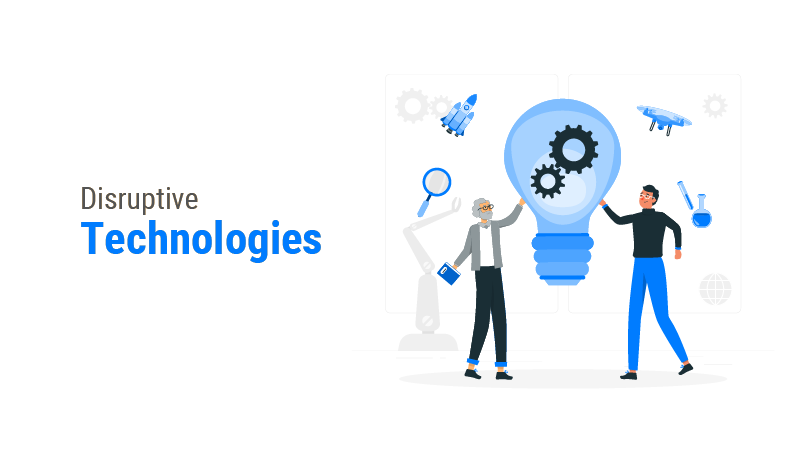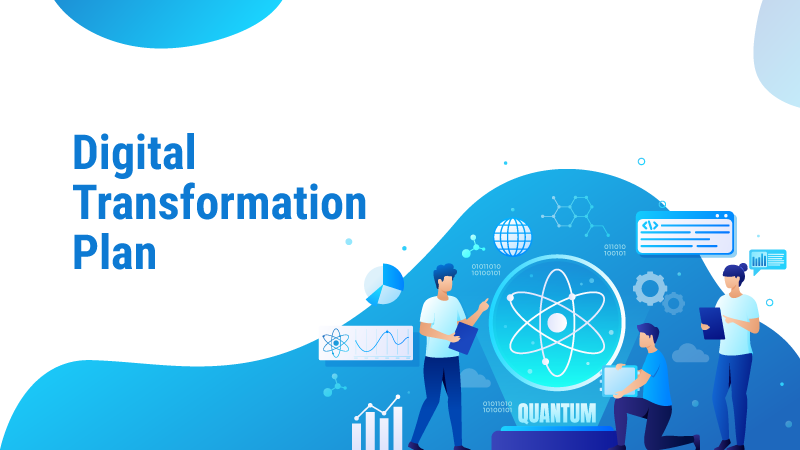Disruptive Technology Examples That’ll Shape The Future

Although the term disruptive technology may represent pictures of high-tech progress in the field of technology, there are many examples of disruptive technology which are used every day by us without even having thought of it. As we know, human progress has evolved over time with the emergence of new disruptive technologies. With endless information at our fingertips and unlimited ways to link and interact instantly, you cannot help but wonder about the future. This article aims to provide a piece of in-depth information about disruptive technologies – defining what the term actually means and examples of disruptive technologies.
What is disruptive technology?
The simplest definition of disruptive technology is a technological advancement that drastically changes the way consumers, businesses, or enterprises function on a regular basis. The already existing models are replaced with disruptive technology due to its improved features. However, it should be noted that in certain cases, disruptive technologies do not fully eliminate the technologies they replace. For example, the television has replaced radio as a source of information and entertainment but it did not eliminate the existence of radio. Later, after a point in time, another disruptive technology will replace television as well. Over time, those disruptive inventions that are successful become the norm, and in due course, these disruptive technologies are replaced by new ones.
Disruptive Technologies – Examples
There are a lot of examples of disruptive technology. We have already pointed out disruptive technologies like the radio and television. Now we are going to discuss some of the examples of disruptive technology that are shaping the current world.
Cloud computing
One of the best examples of disruptive technologies is Cloud which has become very common in our day-to-day lives. Cloud computing businesses not just store and analyze a huge quantity of data, but also support videos, music, and video games streaming to consumers. Moreover, users can access strong computer systems to finish complex tasks through the Internet. Cloud computing has also contributed to many pristine opportunities that provide services that are unique to businesses with the help of cloud delivery models like SaaS, PaaS, and IaaS. Netflix, Google Docs, and Spotify are some of the platforms that take advantage of the cloud.
Blockchain
Blockchain technology has received massive attention as it is at the heart of cryptocurrency. Anyhow, blockchain technology has a lot of potential and has started to disrupt the financial services sector. Blockchain uses a decentralized network as a ledger that distributes across numerous devices. Bitcoin, the first application of Blockchain, has developed to disrupt the banking industry, where ledgers are highly consolidated in a particular bank or consortium of banks. The 3 key attributes of blockchain include:
- Decentralization
- Transparency
- Security
These three features aim to minimize the fees imposed by banks while making secure financial transactions. The main objective was to facilitate speedy transactions free from restrictions and the risks of a single authority. Though blockchain is in its early phase of infancy and needs more control, there is no doubt that this technology will continue to develop, playing an important role in changing obsolete and inefficient business practices while delivering wealth and rights back to the people.
Internet of Things
IoT or the Internet of Things refers to everything that is connected to the Internet, which facilitates sending and receiving data (intercommunication) over Wi-Fi, cellular data, or Local Area Network (LAN). IoT will witness new relationships developing between objects and other objects, people and objects, and people and other people – all results in making our smoother, efficient, and effective. While IoT relies largely on the cloud, it is also disruptive in its own way. IoT will change our cities to smart cities, which are more efficient, cheap, and safer to reside in – all with the help of sensors. Further developments may see alarms turning off in the morning, a coffee maker brewing coffee, or our refrigerator ordering food whenever there is a shortage of food items.
Robotic Process Automation
Nowadays, all types of organizations use different types of automation to increase efficiency, save time, and reduce process costs. Robotic Process Automation (RPA) services use software bots that collect data on how we communicate with different applications and imitate the same behavior with the least human intervention. While not all business processes are RPA-compliant, high-volume, monotonous tasks that follow a set of consistent rules are most suitable for RPA. With the constant evolution of technology, one thing to be sure is that RPA will play a major role in disrupting many of the processes that are widely used and accepted today.
Artificial Intelligence
Artificial Intelligence development has already been a part of our lives for decades. It is currently implemented in areas such as the detection of fraudulent activities, spam filtering in emails, video games, and many more applications. Along with improvising the lives of individuals and increasing the efficacy of business operations, it is growing faster than ever with numerous applications. This AI also needs to gather data from the customer’s search histories, previously purchased products, or conversations to identify their preferences in order to provide customized products and experiences. For example, virtual assistants like Google’s Home and Apple’s Siri perform according to the user’s command. They obtain data according to user preferences and the companies use such data to provide customized services to the user.
Similarly, AI-powered autonomous vehicles are designed to provide certain benefits like minimized road accidents, more efficient fuel consumption, and less traffic congestion. While it is hoped that future applications of AI will shape our lives in an easier and more efficient way, there are some who are wary not only of this technology but also of the number of manual jobs that may get replaced. However, not everyone attributes the growth of this industry to ‘humans vs. AI’, but as a combination of the two to build a better world for us.
Wrap Up
We have only experienced a small part of what is yet to come. However, one thing is for sure, these five technologies will definitely play a major role in changing society and the world itself as we already know.
Blogs by Category
AppForms Artificial Intelligence Blockchain Call Centers Chatbots Cloud Computing Data Management Design Digital Marketing Digital Transformation Enterprise Applications FinTech Insights LowCode Development Microsoft Mobile Apps News Office 365 Robotic Process Automation Security SharePoint Software Development Web ApplicationHow to Create the Perfect Digital Transformation Plan?

2023-12-20 10:27:38